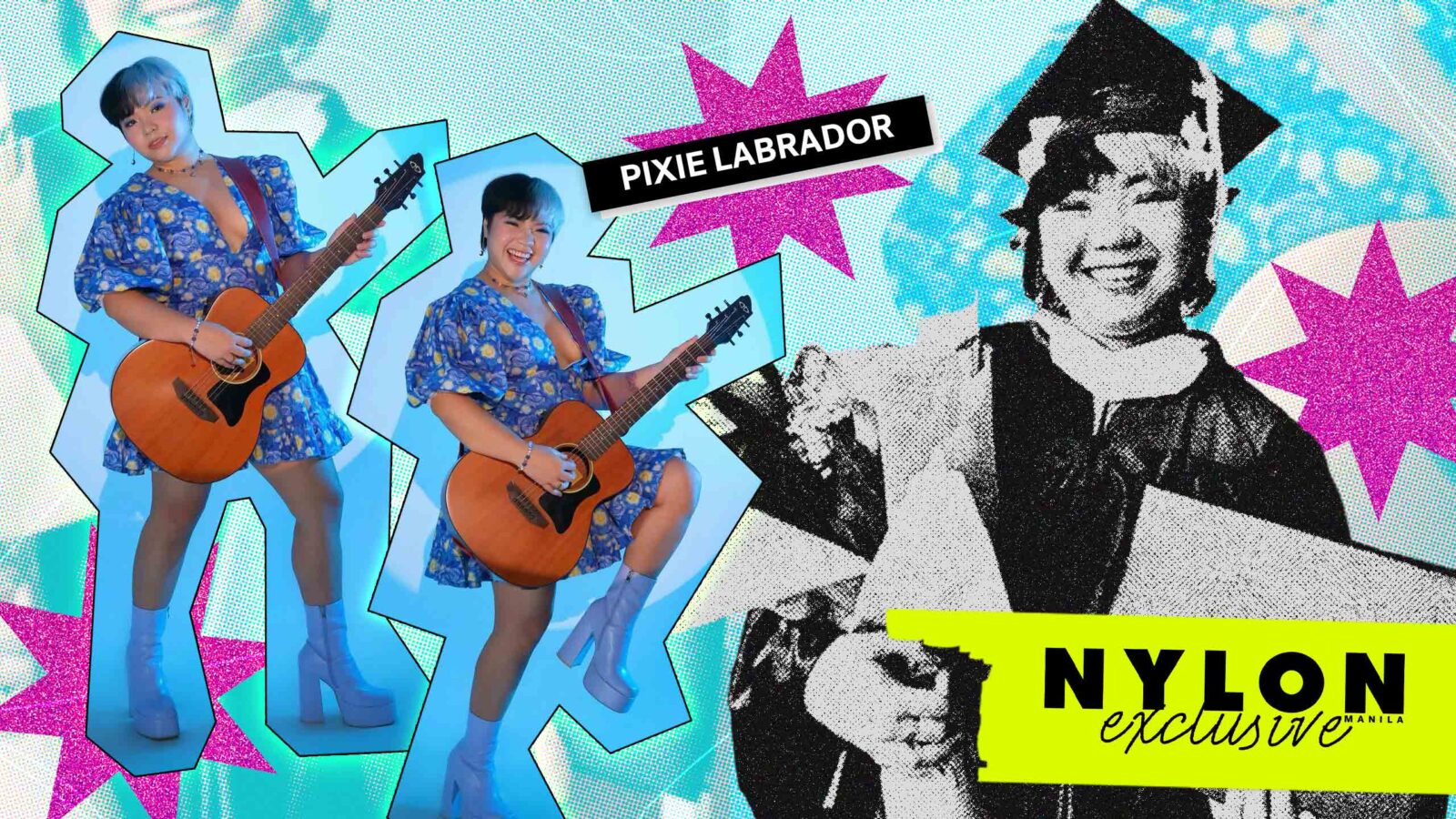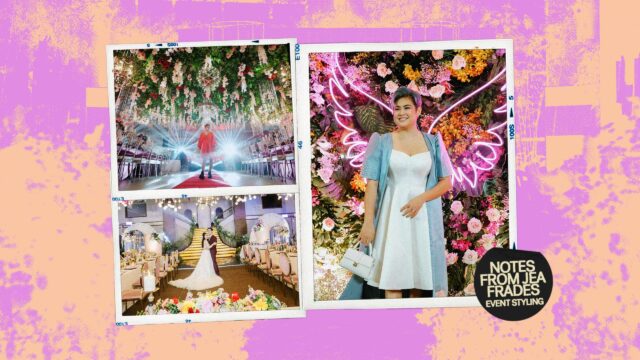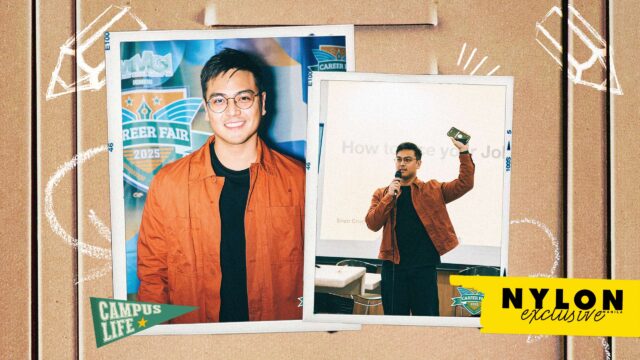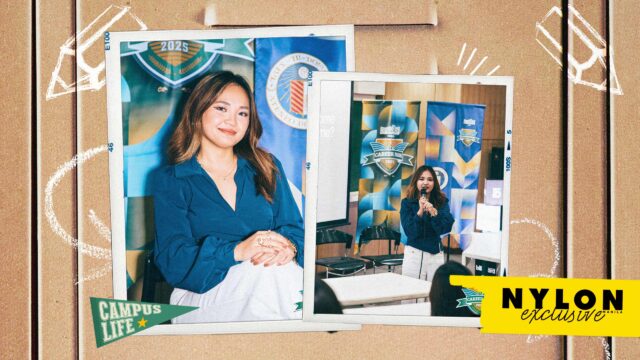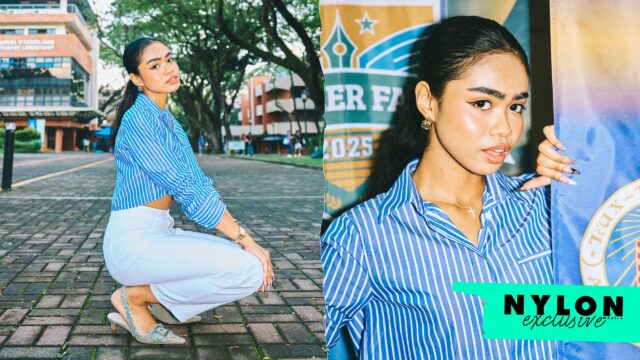Get to know this young queer Filipina artist and her unique pov that fuels her music and storytelling.
Like any good story, Pixie Labdrador’s, or at least how she found herself studying abroad, begins with a breakup. In 2022, Pixie went through a bad breakup, the kind that has you lose yourself in the process and brings you on a path of some much-needed soul-searching. But in these moments of uncertainty, Pixie saw a door open for herself. “It was difficult to accept that I had lost myself in that way. So, I had this really strong urge to do some soul-searching, and from there, a little voice in my head told me to research master’s programs,” she recalls in an interview with NYLON Manila.
One thing led to another, and Pixe soon found herself pursuing a master’s degree in Songwriting & Production at BerkleeNYC, one she graduated from this year.
THE VULNERABILITY TO BE TRUE TO YOURSELF
Such is the life of Filipina singer-songwriter and producer Pixie Labrador who has never been afraid to listen to her heart. The 25-year-old queer artist combines her pop-folk sounds with personal lyrics on love, heartbreak, longing, passion, and more that would be at home in any journal for music that speaks to queer love and heartbreak. Music has always been Pixie’s passion, and she’s using her talents to help bring about better representation of sapphic OPM. Her craft, which is always written from the heart, moves and makes people feel seen and heard so they can embrace and express their true selves.
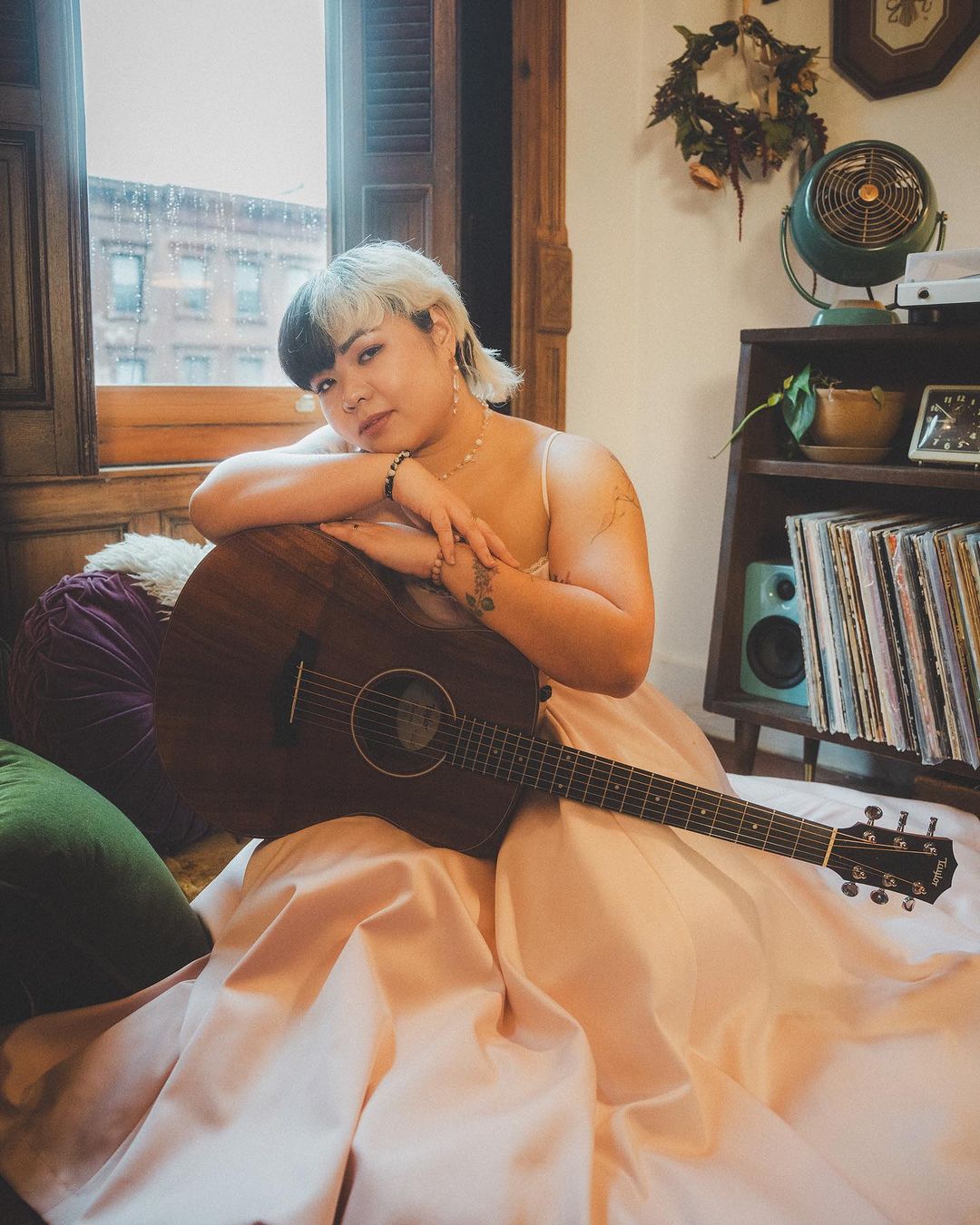
INSTAGRAM/FAIRYFUNFWEE
And with her Berklee experience behind her, Pixie is ready to use her newfound lessons to good use, whether it be in the form of a heartfelt ballad or what else strikes her creativity. “Imagine the last time you listened to a song that fit into exactly what you were going through at that moment. I rarely had that kind of catharsis growing up as a queer woman of color, and so I wanted to give that feeling to myself and to the community with my songwriting.”
Get to know more about Pixie, her experiences as a queer woman of color, her passion for safe spaces, and more in our interview with the artist below.
If you could describe who Pixie Labrador is in third person, what would you say?
Pixie Labrador is a Manila-based, Filipino singer-songwriter and producer who uses her platform in the OPM scene to amplify the voices of the sapphic community. Her songwriting, marked by both vulnerability and resilience, offers listeners a safe space to connect with their own identities, encouraging them to embrace authenticity, and the emotional journeys of love, longing, and grief.
A recent graduate of BerkleeNYC with a Master’s Degree in Songwriting & Production, Pixie has honed her craft into a distinct blend of musical theater-inspired lyricism and pop-folk ballads. Her music combines introspective storytelling with rich, emotive soundscapes, creating a fusion that invites listeners to explore both the personal and universal depths of the human experience.
What made you decide to pursue your masters in Berklee?
I went through a tough breakup in 2022, and it gave me really bad impostor syndrome in terms of my creativity and ability to create music. Therapy helped me work through the realization that at some point in my career, my art started to rely a little too much on being able to create with a partner. So when we broke up, I felt like the music I made on my own wasn’t any good. It truly felt like a piece of myself was missing from my own art.
I had to sit with that for a really long time. It was difficult to accept that I had lost myself in that way. So, I had this really strong urge to do some soul-searching, and from there, a little voice in my head told me to research master’s programs. Long story short, listening to that voice pretty much became the best decision I ever made. I grew so much mentally and emotionally, and got out of that deep, depressive creative block. Now, my relationship with my music is the best it’s ever been.
How would you describe your experience moving to a new city and studying in a new environment?
It was seriously life-changing. It was giving “main character in a coming-of-age film.” Some people say New York is overrated, but I definitely romanticized my stay as much as I possibly could. Moving to New York was my first time traveling outside Asia, so it was a lot of fun learning the culture and taking in all those new experiences. I almost wish I had come there as a tourist rather than a student because there was still so much I didn’t get to do despite being there for a year!
But when it came to studying there, the relationships I made at Berklee were definitely one of my favorite things about it. I love the cohort. I love the amount of diversity. Every day feels like I learn something new about a different part of the world, its culture, its music, and how it influences different people. The thought that we all come from different backgrounds, yet are connected by this one passion, is so beautiful. The sense of community and being a part of something bigger than myself was truly irreplaceable.
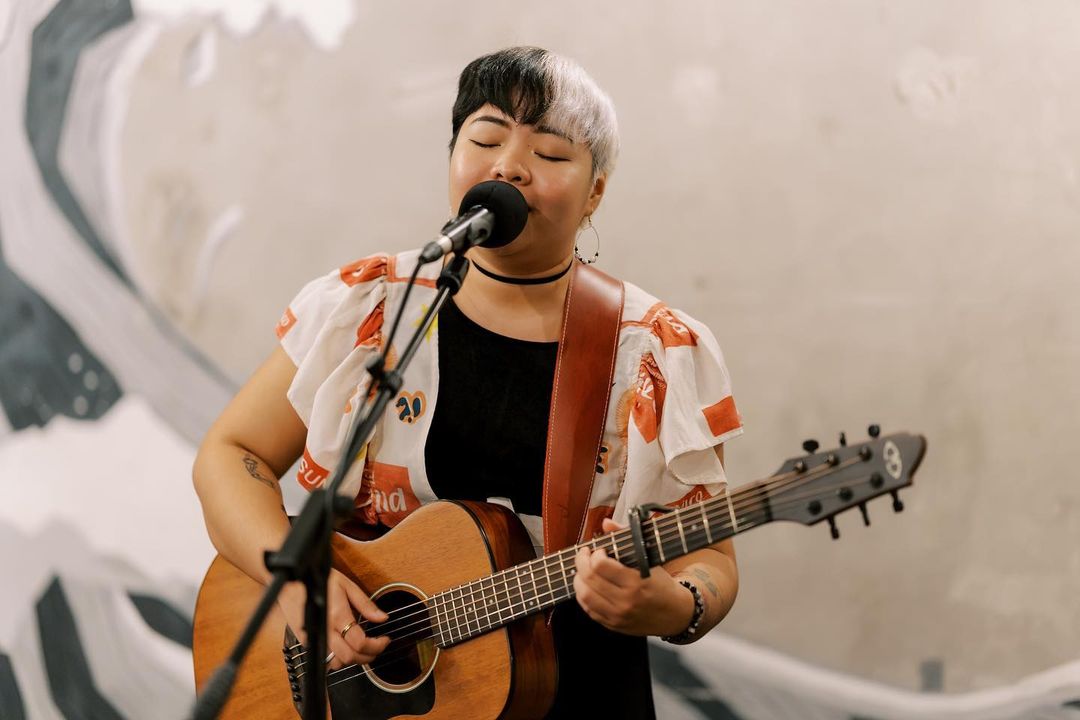
INSTAGRAM/FAIRYFUNFWEE
Was it hard balancing your responsibilities as a student with your career as a musician?
To be honest, I never felt like I had to “balance” anything! Looking back, I definitely approached school as a building block to my career, as opposed to something that was taking me away from opportunities. I found it was very similar to preparing for a new album cycle – there needs to be some time off to get everything right before release.
I know that, publicly, it may look like I haven’t been as “active” as I was prior to my master’s, but what my audience doesn’t see is that what’s been going on behind the scenes is unlike any level of preparation I’ve ever done before. Even I’ll admit that it’s been hard to keep quiet about what I’ve been up to, but once we finally get the ball rolling again, I know it’s going to be so worth the wait!
Has your time in Berklee shaped the way you see your music? And if so, how?
Absolutely. I think that, while Berklee taught me how to analyze and critique music with a sharper ear, I also learned how to take myself and my creative process much less seriously, and that has been extremely freeing. Now that I’ve been in a good number of collaborative sessions, and have seen the works in progress of people I highly admire, you’d be surprised how often “mistakes” end up in the final product that you never would’ve guessed were not supposed to be there. Knowing that, it’s laughable how often we lose sleep over our own ideas of perfection.
Of course, a lot of times, it can be difficult to quiet that inner critic, so that’s something I want to actively keep working on moving forward. Personally, I love listening to demos and first drafts and things like that, so I’d love to build up that level of self-confidence to be able to share more of a “human”, vulnerable aspect of my art with my audience.
What advice would you give to Gen Z who are thinking about studying and even pursuing their creative passions?
This might sound bizarre, but I would say not to go into art school with the goal of making “good” art. The best piece of advice I’ve gotten about creating is that our outputs will never reach our standards because they both grow at the same rate. So, the gap between what we create and what we want to create will somewhat always be there, and trying to close it will drive you insane. And if we actually do reach our standards, then there’s no driving force to want to keep getting better! When I got that in my head, I had a lot more fun making music, and was a lot kinder to myself.
So, rather than solely focusing on making “good” art, use school as a transitional period to figure out your unique style, the methods that work best for you, and the people you can form a community with. Remember, school isn’t the end-all-be-all of your career. It’s merely helping you build a foundation, and you’ll only know for sure what works for you if you keep on experimenting. So, let go of perfectionism. Use this era to allow yourself to create without judgment!
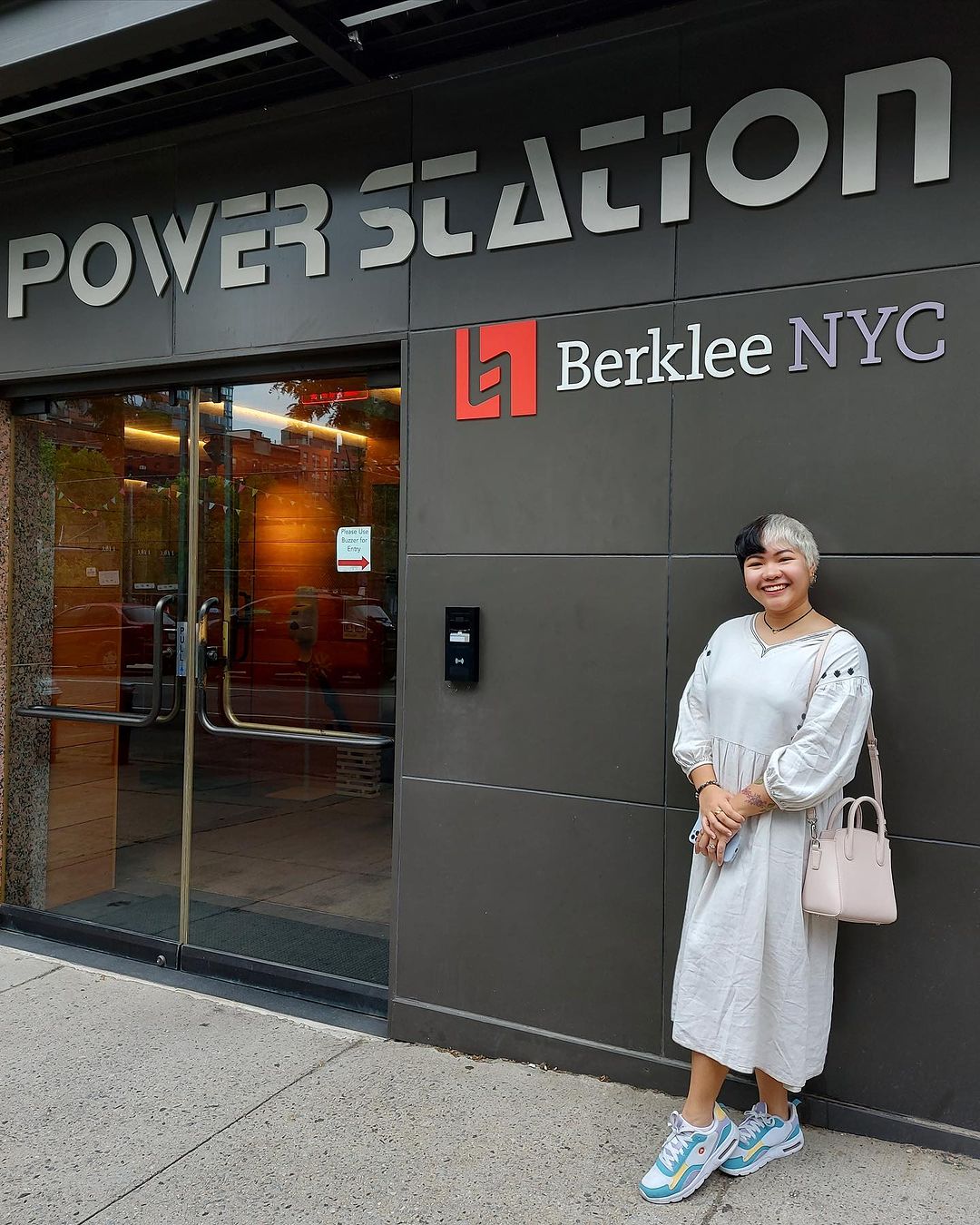
INSTAGRAM/FAIRYFUNFWEE
When it comes to writing lyrics, what do you think differentiates a good lyric from a bad lyric?
In my experience, the biggest compliment my lyrics have ever received is that they make the listener feel like they are watching a movie. I’m a strong believer that music should be a full sensory experience, and that can be done through great storytelling and a ton of sense-bound language. What are the characters in your song seeing and feeling? What do they want? Where are they? Who are they speaking to?
People are scared of getting into these nitty-gritty details for fear of losing relatability, when on the contrary, I think my best lyrics have come from being as specific as possible in setting the scene for the audience. So, I think a good lyric is determined by how much you’re able to make a listener experience something they’ve never experienced in real life.
Why do you think representation in OPM is important?
One of the reasons why I started writing in the first place was because during the time I fully accepted my sexuality, I didn’t see myself being represented enough in music, much less in OPM. So, there was a period of time when I thought my identity wasn’t deserving of art. Like, I was too “different” to have music be written about someone like myself. Imagine the last time you listened to a song that fit into exactly what you were going through at that moment. I rarely had that kind of catharsis growing up as a queer woman of color, and so I wanted to give that feeling to myself and to the community with my songwriting.
Representation is important because it helps people on their journey to self-acceptance and self-love, and gives them a much greater sense of belonging, especially if they’re in an environment where they physically can’t express themselves. While representation plays a significant role in the diversity of art, we have to remember that a big part of it is also about creating safe spaces, and being a voice for the voiceless.
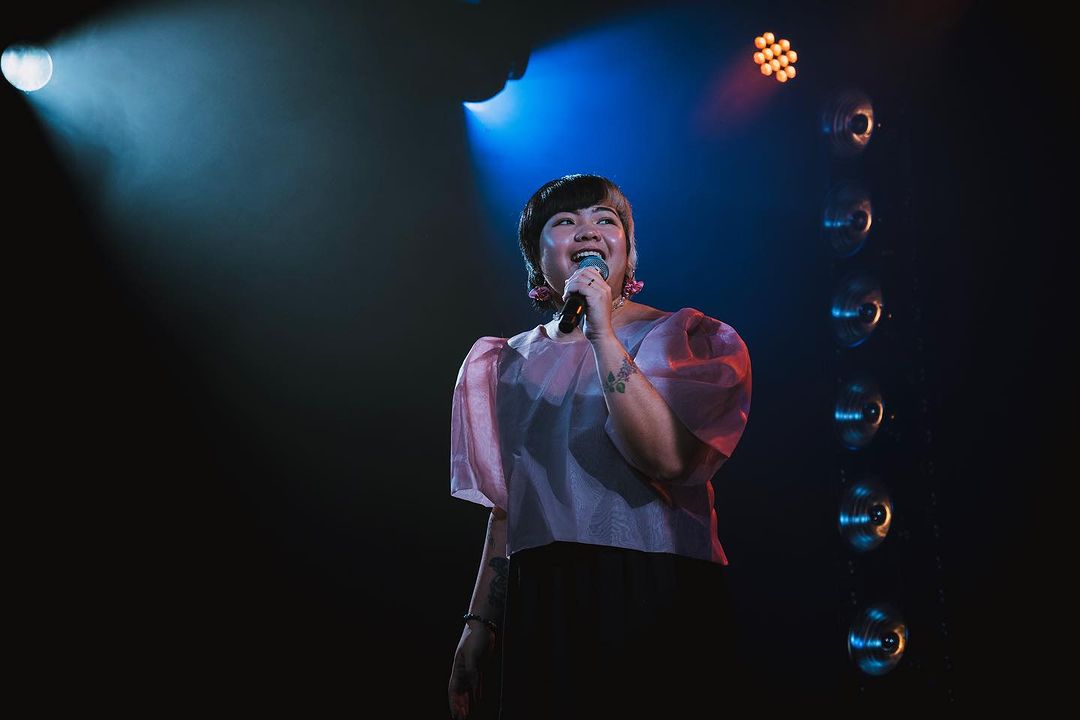
INSTAGRAM/FAIRYFUNFWEE
Do you think Filipinos are ready for sapphic OPM?
Filipinos have been ready for a lot longer than you might think, and I strongly believe this from meeting a good chunk of my listeners! Now that I’ve been releasing music for more than a few years, I feel like I’ve underestimated how diverse my demographic actually is. I get heartfelt messages from queer women in their 30s. I’ve had middle-aged sapphic couples come up to me at gigs.
Whenever I visit my old high school, the students strike up conversations about my music with me as well. It’s so meaningful to know that my music is being embraced on an intergenerational level, and that all these interactions share the same sentiment of representation being a big part of their listening habits. It just goes to show how much potential sapphic OPM has of breaking into the mainstream, and how people have been ready to move it forward!
If you could only play one of your songs to someone who hasn’t heard of you yet, what would that be and why?
I will never not recommend Varsity Crush for first-time listeners. The storytelling draws you into the speaker’s world, and feels as if you’re witnessing these events in real-time – something I feel like I’m most commended for in my songwriting – and the beat is reminiscent of pop-country Taylor Swift. It’s a nakakakilig, feel-good story about yearning first-love in the perspective of a queer high school student. I think it’s very relatable as a lot of my listeners have associated the song with similar events that have happened to them in their own sapphic awakenings. Also, if you loved the film “Rookie” directed by Samantha Lee, fans have pointed out parallels between Ace and Jana’s story with this particular song!
Continue Reading: What Is Queer Joy? Empower And Celebrate Through Another Aspect Of Queer Existence
